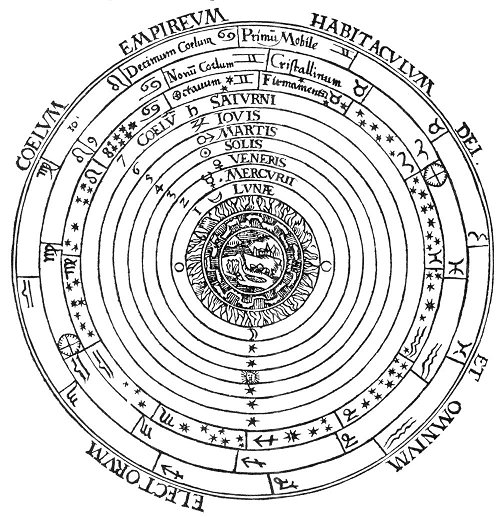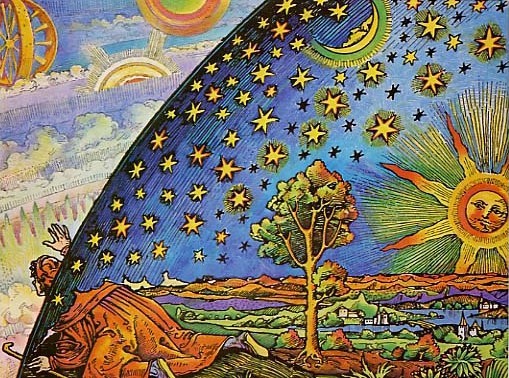Gnosticism was a religious way of life, originating in Israel and Egypt just after the time of Christ. It's a blend of Christianity, platonic and Egyptian religions that could only have blended in Alexandria. It seems to have spread widely south of the Hebrew lands into north Egypt.
Gnosticism is difficult to define because it was never a religion with fixed dogma; it was about a process, and that was ill-defined.
There seems to be two broadly different approaches to the wisdom (the "gnosis") that is required to get back to the divine realm. But that requires an understanding of how the Alexandrians viewed the cosmos.
The cosmos of Gnosticism is very Aristotelian. Here are the shells of the universe, starting with the Divine on the outside:
- God/the Divine always existed. He created the Son to admire Him and contemplate Him. The Son created some spirit-like aspect of us to admire them both.
- The Demiurge is not divine, but has some aspect of being less than perfect. The demiurge created all the spheres which lie inside the realm of the divine. The demiurge is the Prime Mover, rotating stellar sphere from the outside once per day.
- The sphere of the stars contains the visible universe. It is black, with small holes through which the divine realms shine. The holes allow us to pass down into mortality. The stars contain the twelve punishments affixed to mortality. As we descend we fix our punishment. As we ascend any un-repented sin must be purged or we cannot make it back through the holes unless we suffer that punishment. But if we have left all the vices behind, and through the atonement of Jesus, we can avoid the punishment and pass through the starry sphere to heaven.
- The spheres of the planets, or "wanderers," are crystalline, transparent shells with one hole in each, the planet. Each planet represents a vice of the world. As we descend we circle around to each planetary disk and pass through, gaining the vice associated with each:
- Saturn imparts avarice and greed
- Jupiter imparts gluttony
- Mars imparts anger
- The sun gives us pride
- Venus gives us lust
- Mercury gives us envy and lies
- The moon imparts sloth to our souls.
- Descending, we pass through the spheres of fire, air, water then earth to complete the cosmos. [Note that when Aristotle meets the Catholic church in the hands of Thomas Aquinus, hell gets put into the center of earth.]
- Once mortal, we possess the punishments and vices we picked up during our descent.

All mortals descend from the divine, accepting the punishments and vices as we pass through the stars, and through each of the planets. What vices and punishments did we get? Tell your birthday to an astrologer and they can tell you which constellation you passed through, and where the planets were as you passed through each of them to get to earth. Then you'll know which vices are troubling you the most, and the astrologer can then help you time important events and tell you how to create talisman, eat foods, and pray to specific gods that will help undo the vices you inherited on your passage down. Our goal is to pass back up to gain the divine realm. How we do that depends on which of the two broad categories of Gnosticism we believe.

The two broad interpretations of Gnosticism are optimistic gnosis and pessimistic gnosis. They differ in how you go about getting back into the divine.
- Optimistic Gnosis assumes we are all good, but unlearned and not yet wise. The wisdom comes through contemplating the world and all things in it, since it was all created by the demiurge who was created by a denizen of the divine realm. Sensations, arts, creatures, all studied so that you can understand the whole of creation and thus understand God (this is the sought-for gnosis) because you will be like God. This is a sort of pantheism, everything is part of God.
- Pessimistic Gnosis holds that the world is all evil, and you must free yourselves from mortality, vices, and punishments by getting rid of each vice and punishment. Once free, you can then pass back up through the planetary spheres because they no longer have influence over you. Freedom comes through a sort of self denial.
Both styles of Gnosticism require reflecting on the world. Pessimistic Gnosticism requires understanding evil, optimistic Gnosticism requires understanding God. In practice each Gnostic had part of each.
In the early alchemical writings, particularly the Corpus Hermeticum, Gnostisism plays a big role. Here are my notes from Pimander, Book One of the Corpus:
- Verse 1 of the Corpus is a statement that the writer desires gnosis.
- v. 4 states that divine=light, world=darkness
- v. 5 has the Word (logos) separating fire and air from water and earth (similar to Genesis)
- v. 6 holds that Mind=Light=God, Word=Son, elements=Dark
- v. 7 teaches the divine realm extends to the Beyond
- v. 8 has elements coming from the Word=Son who created the earth
- v. 9 God=Mind created the planets and stars to enclose the sensible cosmos
- v. 10 the Atonement of the Son allows him to re-enter the divine
- v. 11 the Son atones with Reason (the demiurge) to reunite with the divine
The best understanding of Gnosticism I've read is Francis Yates Giordano Bruno and the Hermetic Tradition, 1964, Routledge Press.